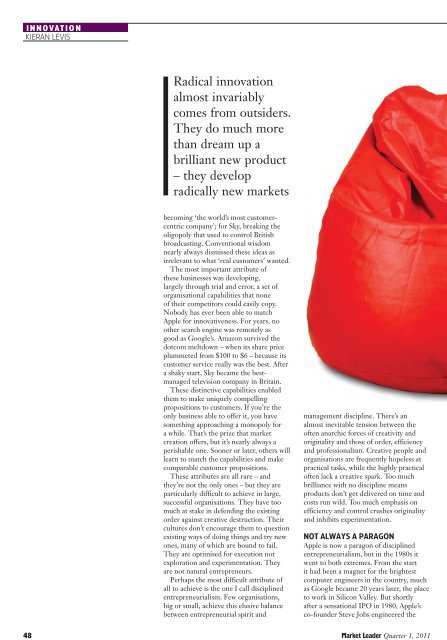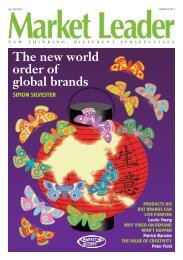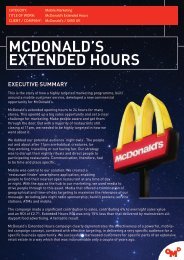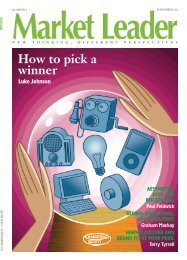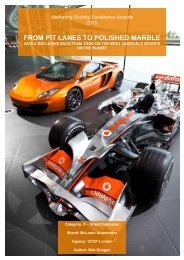MARKET LEADER q1 11 COVER draft 1.indd - The Marketing Society
MARKET LEADER q1 11 COVER draft 1.indd - The Marketing Society
MARKET LEADER q1 11 COVER draft 1.indd - The Marketing Society
You also want an ePaper? Increase the reach of your titles
YUMPU automatically turns print PDFs into web optimized ePapers that Google loves.
i n n ovat i o n<br />
kieran levis<br />
Radical innovation<br />
almost invariably<br />
comes from outsiders.<br />
<strong>The</strong>y do much more<br />
than dream up a<br />
brilliant new product<br />
– they develop<br />
radically new markets<br />
becoming ‘the world’s most customercentric<br />
company’; for Sky, breaking the<br />
oligopoly that used to control British<br />
broadcasting. Conventional wisdom<br />
nearly always dismissed these ideas as<br />
irrelevant to what ‘real customers’ wanted.<br />
<strong>The</strong> most important attribute of<br />
these businesses was developing,<br />
largely through trial and error, a set of<br />
organisational capabilities that none<br />
of their competitors could easily copy.<br />
Nobody has ever been able to match<br />
Apple for innovativeness. For years, no<br />
other search engine was remotely as<br />
good as Google’s. Amazon survived the<br />
dotcom meltdown – when its share price<br />
plummeted from $100 to $6 – because its<br />
customer service really was the best. After<br />
a shaky start, Sky became the bestmanaged<br />
television company in Britain.<br />
<strong>The</strong>se distinctive capabilities enabled<br />
them to make uniquely compelling<br />
propositions to customers. If you’re the<br />
only business able to offer it, you have<br />
something approaching a monopoly for<br />
a while. That’s the prize that market<br />
creation offers, but it’s nearly always a<br />
perishable one. Sooner or later, others will<br />
learn to match the capabilities and make<br />
comparable customer propositions.<br />
<strong>The</strong>se attributes are all rare – and<br />
they’re not the only ones – but they are<br />
particularly difficult to achieve in large,<br />
successful organisations. <strong>The</strong>y have too<br />
much at stake in defending the existing<br />
order against creative destruction. <strong>The</strong>ir<br />
cultures don’t encourage them to question<br />
existing ways of doing things and try new<br />
ones, many of which are bound to fail.<br />
<strong>The</strong>y are optimised for execution not<br />
exploration and experimentation. <strong>The</strong>y<br />
are not natural entrepreneurs.<br />
Perhaps the most difficult attribute of<br />
all to achieve is the one I call disciplined<br />
entrepreneurialism. Few organisations,<br />
big or small, achieve this elusive balance<br />
between entrepreneurial spirit and<br />
management discipline. <strong>The</strong>re’s an<br />
almost inevitable tension between the<br />
often anarchic forces of creativity and<br />
originality and those of order, efficiency<br />
and professionalism. Creative people and<br />
organisations are frequently hopeless at<br />
practical tasks, while the highly practical<br />
often lack a creative spark. Too much<br />
brilliance with no discipline means<br />
products don’t get delivered on time and<br />
costs run wild. Too much emphasis on<br />
efficiency and control crushes originality<br />
and inhibits experimentation.<br />
Not always a paragon<br />
Apple is now a paragon of disciplined<br />
entrepreneurialism, but in the 1980s it<br />
went to both extremes. From the start<br />
it had been a magnet for the brightest<br />
computer engineers in the country, much<br />
as Google became 20 years later, the place<br />
to work in Silicon Valley. But shortly<br />
after a sensational IPO in 1980, Apple’s<br />
co-founder Steve Jobs engineered the<br />
48 Market Leader Quarter 1, 20<strong>11</strong>


